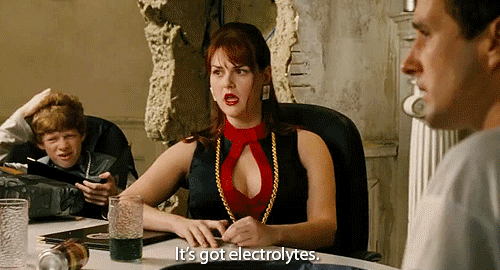 AMP v. Myriad Genetics (click here for Wiki page including SCOTUS decision)
AMP v. Myriad Genetics (click here for Wiki page including SCOTUS decision)
In the movie, "Idiocracy", actor Luke Wilson plays the role of an Average-IQ Joe ("Joe Bauers") who is transported into a future where every American is so dumb (or brain washed by political dogma) that Joe turns out to be the smartest man in America.
How dumb are they all?
So dumb that they don't know to irrigate their crops with "isolated" (pure) water.

They all believe, due to repeated brain washing, that a drink called "Brawndo" (a spin on Gatorade) has to be used for everything (including feeding their crops) because ...
because "it's got electrolytes".
They have no clue what these electrolytes are and why they are "good". This taken on pure faith.
On June 13th 2013, America sunk deeper toward its inevitable collission with an "Idiocracy" future thanks to the U.S. Supreme Court decision on patenting of "genes".
At least one of the Justices (Scalia) admits he has no idea what an "isolated gene" is; but in his being one of the "Supremes", one of the isolated deities who rule America, he must agree that the thing he fails to understand is nonetheless not patent "eligible". Scalia wrote (in concurrence):

"[Admittedly, I don't grasp the] fine details of molecular biology. [Even though] I am unable to affirm those details on my own knowledge or even my own belief [it] suffices for me to affirm [their idiocracies], having studied the opinions below and the expert briefs presented here, that the portion of DNA isolated from its natural state sought to be patented is identical [...IDENTICAL...] to that portion of the DNA in its natural state; ..."

Welcome to Idiocracy USA --we got electoral college "lytes"
At least a few sites get it on how "sketchy" the Supremes are in their science:
(1) The Supreme Court’s Sketchy Science
(2) Supreme Court bungles the science in DNA patent decision
(3) Supreme Court Gets ... Science Wrong
(4) Errors in Supreme Court Decision
(5) On "Junk Science" --Wiki
(6) The art of the metaphor (See also Metaphor & Policy in Patent Landmines-stan)
No. The anti-patent Justices are wrong !
They are 101% sure the chemicals are
I ♦ D ♦ E ♦ N ♦ T ♦ I ♦ C ♦ A ♦ L
But the chemicals are not "identical".
One has posi-traction ...
No not positraction. Sorry. Too much "My Cousin Vinny".
But if Marissa Tormei had been a biochemist,
she could have explained to the Justices about molecules,
about electron wave functions,
about protein folding,
about what "identical" really means.
 http://en.wikipedia.org/wiki/DNA
http://en.wikipedia.org/wiki/DNA

5 comments:
The irrationality of the AMP v Myriad decision is being celebrated by some nationalities (for example, those willing to offer lower prices after free-riding on Myriad's pioneering work):
Patent justice
Here is the justification given by one anti-patent observer:
‘If you ask the general public whether DNA should be patented, the overwhelming reaction is no, it would be crazy’
Source= US supreme court rules genes can't be patented
What else should we ask of the "general public"?
See Evolution (Not) Accepted in U.S.
Link to REAL TIME GOOGLE COVERAGE:
US Supreme Court decision to bar gene patents opens genetic test options
ex-CAFC Judge Michel criticizes the AMP v. Myriad decision by Supreme Court:
Myriad Criticized for Lack of Guidance
Repost in Economics section and you will get a good solid answer.
I definitely believe that technology counts as part
of a culture. To see an example of how it factors in, you only need to look at the Amish.
A strong cultural tie holding their people together is the fact
that they have chosen as a group (a culture)
to NOT use technology. . . Similarly, you can
look at how cultures change when technology changes.
It would be easy to argue that the culture of America is
clearly different now than it was in 1940, and part
of that is the vast improvements and commonplace usage of technology
since then. Of course, there are also many other factors, but that is one.
Feel free to surf to my weblog ... Elliott Broidy
Post a Comment